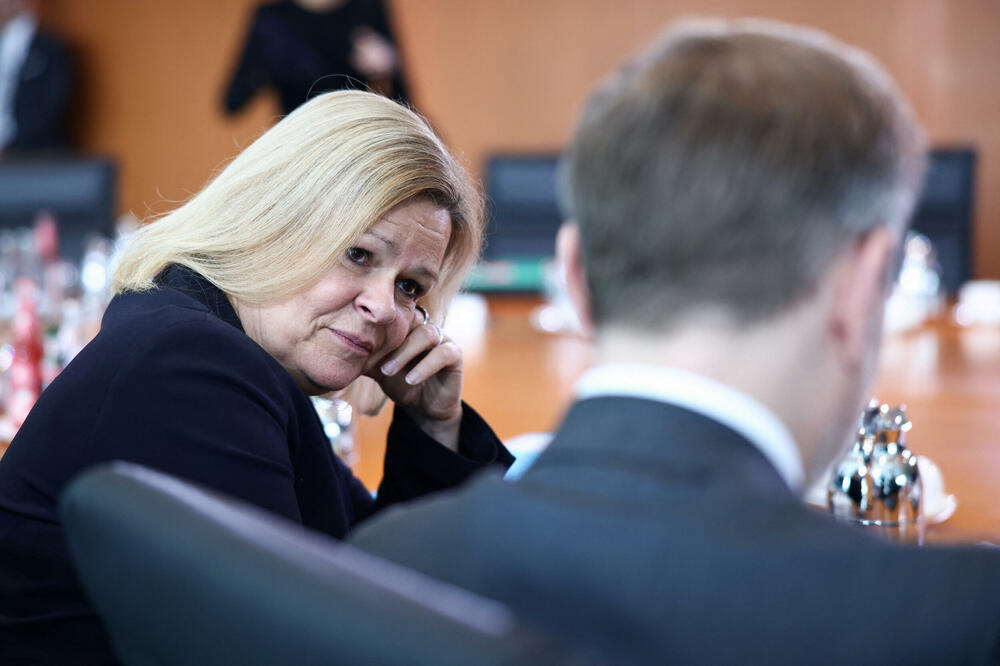Germany's interior minister warns of Moscow's new efforts to influence public opinion. What is "hybrid warfare?" How to oppose him?
The threat of Russia using cyberattacks, propaganda and other tactics to influence public opinion in Germany is real and growing, according to Germany's Interior Minister, Nancy Feser. "Dangers have reached a new level," she told the "Zidejche Zeitung" newspaper.
Her warning comes as Germany prepares for European Parliament elections in June and elections in Germany's three federal states in September. There is growing concern that Moscow will try to win support for pro-Russian parties, such as the far-right populist Alternative for Germany (AfD), ahead of the vote.
Germany has long been the target of Russian influence operations. Since the beginning of the Russian invasion of Ukraine in 2022, many of these operations have been aimed at undermining support for Ukraine.
"Now it's about showing determination and strength in the face of this and exposing how the other side operates," says Ridiger von Fritsch, the former German ambassador to Moscow and former vice president of Germany's BND foreign intelligence service.
What is hybrid warfare?
The term "hybrid warfare" describes a complex strategy that combines military tools with unconventional methods ranging from increasing economic pressure to spreading propaganda.
It is not a new phenomenon. For centuries, states have used non-military means to influence public opinion abroad.
But over the past two decades, the rise of the Internet and social networks has brought a new arsenal of Internet weapons: in what are known as "hack-and-leak" operations, hackers gain access to sensitive or confidential information and then strategically release it to the public.
Cyber attacks can also be used to bring down a country's critical infrastructure, including the machines and software used in elections. At the same time, social media platforms are used to spread fabricated or wrong information.
"The digital world is a dream come true for intelligence services," von Fritsch told DW.
How does it work?
Hybrid warfare is often described as a form of "shadow war" that takes place far from the public eye and is never officially announced.
"The concept of hybrid warfare is that at first you don't notice it's happening," Leslie Schiebel, a Russia expert at the Kerber Foundation in Hamburg, told DW.
In January, the German government said it had uncovered a coordinated Russian disinformation campaign on the X platform, formerly Twitter. Before it was shut down, the campaign distributed more than a million messages via fake profiles, pushing false or misleading stories, such as that aid to war-torn Ukraine was neglecting local citizens.
By spreading such messages on a large number of Internet platforms, Russia wants to maximize its visibility and foster a sense of legitimacy. The goal, experts say, is to widen social divisions, fuel anger and sow distrust in democratic processes and the media.
"For Russia, spreading suspicion is already a success," says Schibel.
The effect of the Taurus leak
While most forms of hybrid warfare remain in the shadows, some operations are deliberately made public.
At the beginning of March, the head of Russian state television RT published a confidential conversation between high-ranking German officers. The affair, known as the "Taurus leak", embarrassed the German military and caused a diplomatic uproar.
"But the affair also serves Putin at home," says Maria Sannikova-Frank, who heads the Russia program at the Berlin-based think tank Center for Liberal Modernity.
In the wiretapped conversation of German officers, they could be heard discussing possible scenarios of a Russian war in Ukraine. After the conversation was released, Russian media claimed that the tape revealed that the German military had discussed significant and specific plans to attack Russian territory.
"The picture he (Putin) wants to create is that Germany and the West are threatening Russia, and he has successfully revealed that," Sannikova-Frank told DW. "He also successfully diverted attention from the death and funeral of Alexei Navalny," she adds.
Navalny, who was one of Putin's most outspoken opponents in Russia, died in mid-February at the age of 47 in a penal colony in the Arctic. He was buried on March 1, the same day that the wiretapped conversation of German officers was published.
How to fight back
Countering hybrid warfare requires a multifaceted approach, experts agree. Countries must adequately protect their critical infrastructure, including voting technology, from cyberattacks.
The Taurus leak - in which Russian intelligence gained access to military communications because one of the conversation participants connected via an unsecured connection - also highlights the need to raise cyber security awareness across all sectors of society.
Experts emphasize the importance of educating citizens about disinformation tactics and how any information they come across on the Internet can be deliberately designed to mislead and manipulate them.
"It is important to discover the mechanisms of this propaganda - how it works, how it affects us, how it affects opinion," concludes Sanikova-Frank.
Bonus video:





